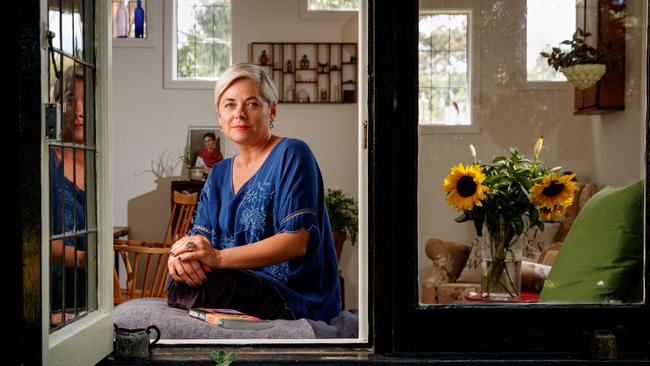Desert’s space, suburbia’s picket fences both can be a prison
A strong sense of place is a vital characteristic of our national literary imagination.

A strong sense of place is a vital characteristic of our national literary imagination. Whether it’s the outback, the bush, the beach or the city, place frames and shapes the stories we tell. It is something darker in two interesting Australian novels, Cassandra Austin’s All Fall Down and Rebekah Clarkson’s debut Barking Dogs. Here place is a stultifying prison, an antagonist to overcome.
All Fall Down is set in Mululuk, a fictional mining community in the South Australian desert, roughly an hour from Coober Pedy. The town is a desolate tract of dugouts and temporary houses and “red, endless red, and scurrying saltbush on top of it”.
The bulk of the action takes place one month after the mysterious collapse of a bridge that spanned a ravine dividing the town. A new bridge has been built in the interim, but authorities are keeping it closed for vague reasons. The residents of Mululuk are divided as they attempt to find the causes for the collapse. Was it sabotage, mechanical failure or divine intervention?
The novel contains some — forgive the pun — gaping plot holes. One month seems a short time to build and pave the second bridge. And would the building company begin construction without determining the cause of the collapse?
Despite these inconsistencies, All Fall Down is engaging and well-realised. It’s couched in the gothic sensibilities of writers such as Barbara Baynton and, more recently, Evie Wyld and Charlotte Wood.
Like them, Austin, who grew up in outback NSW, presents the landscape as a kind of malevolent force. The sun is a “reddened scar” or a “vicious open sore”, while the chasm itself is “a huge red, waterless wound”.
While the hard-bit naturalism sometimes strays towards the melodramatic (“The land who is a greedy son of a bitch and will take what she wants in her time-honoured fashion: death”), it provides an effective backdrop for the violent incidents that bookend the novel.
In the slow-burn lead-up to the dramatic finale, Austin skilfully juggles a number of plot threads involving a panoply of characters: Janice, who miraculously survived the collapse of the bridge; a gassy Franciscan monk and his disaffected teenage niece; an acerbic insurance investigator; and an alcoholic drifter who believes the collapse was the land itself calling for a human sacrifice.
Austin’s first book was the novella Seeing George (2004). This full-length debut is in many ways a conventional novel that derives its tension from the resolution of a series of romantic narratives: a love triangle, an unrequited teenage crush, the tentative reunion of old lovers.
But against the landscape of Mululuk, with its heatwaves and constant dust storms, these love stories take on an almost elemental significance. All Fall Down is essentially a story of people trying to thrive and survive in an inhospitable environment.
Barking Dogs takes place in Mount Barker, a large satellite town in the Adelaide Hills. Described as a “novel in stories”, it shows a place transitioning from a close-knit farming community to an atomised outer suburb, where land is “being sliced up and dug into fake lakes and ill-conceived wetlands, hastily built houses plonked in between”.
The narrative perspective roves between a cast of predominantly unhappy characters struggling with the trappings of middle-class existence. A man re-evaluates his hubristic business enterprise, while his son struggles at school; a married woman yearns for her unavailable colleague.
Adelaide-based Clarkson effectively creates a hermetic world of aspirational angst where seemingly minor incidents — the title is a clue in this regard — can have violent consequences. This sense of foreboding is complemented by a number of ominous plot lines — a missing schoolgirl, a recluse from one of the town’s oldest families — simmering in the background.
The strongest story is The Five Truths of Manhood. It involves Malcolm Wheeler, a doctor who receives a terminal cancer diagnosis. Shell-shocked, he potters around Mount Barker, meditating on his mortality. “He’ll suffer. It will be ugly, as it always is. He’s seen too many people to list who died of cancer. Bowel would have to be the worst.” In this moving, dignified story, Clarkson brilliantly shows the way an entire life can collapse in a few moments.
This subtlety is missing in some of the other stories, which can read like a heavy-handed critique of the materialism of the “aspirational class”. With a few notable exceptions (the unhappy protagonist of Dancing on Your Bones and the sardonic grandmother in Hold Me Close), the characters’ interior lives consist mainly of worries about mortgage repayments and dissatisfaction with the thin windows and architectural trimmings of their newly built homes.
Their manifold petty gripes, their tendency to speak and think in platitudes (“persistence was the key. Never giving up. He had to think like a winner”; “you’re as useless as an ashtray on a motorbike, hun”), and their lack of agency, means the stories often read as minor variations on the same theme: life in the suburbs is a trap that is hard to escape.
In that sense, Clarkson’s novel can be read as a revisionist reimagining of the Australian dream, where picket fences become cell bars, and buying a house can result in a lifetime of indentured labour. Though it can be overly didactic, Barking Dogs effectively shows the claustrophobia and frustration that this kind of lifestyle can produce.
Dominic Amerena is a writer and critic.
All Fall Down
By Cassandra Austin
Penguin, 270pp, $29.99
Barking Dogs
By Rebekah Clarkson
Affirm Press, 240pp, $24.99


